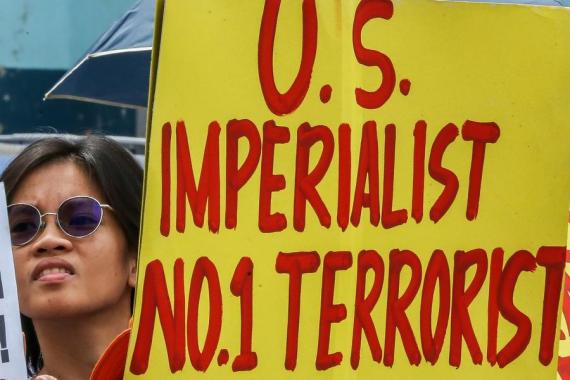People with placards are pictured during a protest rally against the joint Philippine-US military exercise in front of the gate of the Armed Forces of the Philippines (AFP) headquarters in Quezon City, Philippines, April 22, 2024. Photo: Rouelle Umali/Xinhua
KUALA LUMPUR, April 26 (Xinhua) -- The recent escalation of tensions in the South China Sea is due to repeated incitement by the United States, Koh King Kee, president of the non-governmental Malaysian think tank Centre for New Inclusive Asia, said recently.
Association of Southeast Asian Nations (ASEAN) countries prefer to resolve disputes through negotiations and do not support taking confrontational measures on the South China Sea issue, Koh stressed in a recent interview with Xinhua news agency.
The people of ASEAN countries oppose US actions that undermine regional stability, he added.
With the United States considering China as its main strategic competitor for decades to come, shaping an unfavorable strategic environment around China has become a global strategic objective for it to gain geopolitical advantages, Koh said.
The United States is trying to encircle China by strengthening relations with its regional allies, the expert said, adding that the current Philippine government's approach to dealing with the South China Sea issue fits well with the US strategy of containing China.
Currently, the Philippines and the United States are conducting a 19-day joint military exercise called "Balikatan 2024", some of whose activities appear to be provocative, Koh said.
The United States has deployed its new land-based Typhon intermediate-range missile launcher in the Philippines' Luzon, the first time the United States has deployed such a missile system in Southeast Asia, and poses a serious threat to the region's security, Koh said.
Koh stressed that ASEAN countries and China are close neighbours and the two sides are each other's largest trading partners, and said their cooperation is based on a long-term mutually beneficial and win-win relationship.
ASEAN countries generally value their good relations with China, the expert added.
Given the complex situation, ASEAN countries should take more active measures to maintain peace and stability in the region and resolve issues through dialogue, Koh said.
Xinhua/gnews.cz-JaV_07



